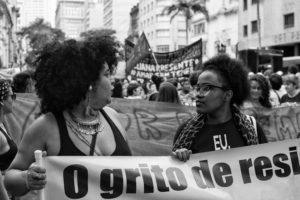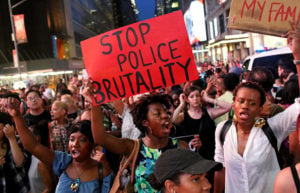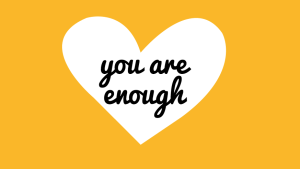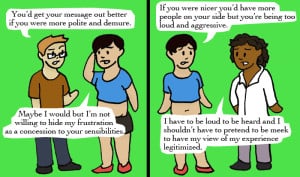
Protestors standing together holding a banner.
This article was originally published by the National Latina Institute, and republished here with permission.
Para leer este artículo en español, haga click aquí.
In the age of Trump, during which white supremacy has not only been given a public face but also has a title in the White House, the historical intricacies of this question are bound to the cycles of oppression that society has internalized and perpetuated.
Calling out anti-Blackness in the Latinx community means acknowledging that Latinx folks can be anti-Black, perpetuate anti-Black racism, and can be white supremacists.
It means highlighting that the Latinx experience is not monolithic, and we must use our political power to fight against anti-Blackness every day.
It means saying, yes, Alex Michael Ramos, you are indeed a racist, and so are the other white, non-Black Latinos who joined you in Charlottesville.
As Latinx Reproductive Justice activists, we must call out anti-Blackness in the Latinx community and fight alongside Black and Brown communities for our collective liberation.
The oppressors’ mission is to divide and conquer — dissuade unity with the promise of prosperity through whiteness and white supremacy. We must challenge this in our beings, our homes, our communities, and our work.
Calling out anti-Blackness in the Latinx community means acknowledging white privilege, calling out the internalized racism, prejudice, bigotry, hate, and violence that we perpetrate.
It means naming that our existence has been colonized, and we have consciously and subconsciously played into the colonizer’s plan to stand as far apart from Blackness and Brownness as possible.
Calling out anti-Blackness in the Latinx community means challenging our families to see the harm they are inflicting on their children, cousins, aunts, uncles, friends and community by posturing oneself as better than Black people, othering our own existence, and reliving the trauma of dictators and colonizers from the Caribbean and Latin America that taught us to hate ourselves.
Anti-Blackness has been institutionalized in the economic and political structures of the Caribbean and Latin America throughout history, just as it has in the United States.
From slavery, the forced expulsion of Black people, and the forced sterilization of women in the Caribbean and Latin America, to eugenics, and “selective” immigration policies in the United States, these are some examples of a shared fight for reproductive justice.
When writing about the systemic abuse of the Black body in the early 1900s, Dorothy Roberts notes:
Eugenicists opposed social programs designed to improve the living conditions of the poor. They argued that adequate medical care, better working conditions, and minimum wages all harmed society because those measures enabled people with inferior heredity to live longer and produce more children.
Professor Roberts’ analysis continues to ring true today, and we can easily use eugenicists and white supremacists interchangeably. White supremacy has been written into many laws that govern this country, and that we have been challenging for decades.
Our economy, education system, immigration system, and healthcare system, among others, were never built to benefit Black and Brown people, immigrants and the poor.
They were built in a way that would allow the social elite to systemically control Black and Brown bodies, prohibit our self-determination, and uphold the patriarchy. Anti-Black racism and white supremacy perpetuate reproductive oppression.
Calling out anti-Blackness in the Latinx community is part of dismantling the systems of oppression that continue to criminalize our communities and our bodies, separate our families, and jeopardize our well-being.
Calling out anti-Blackness in the Latinx community means challenging the dominant narratives around general health care access, immigration and reproductive health including abortion. It means seeking out and lifting up data points that are inclusive of all of our communities and reflect all aspects of our lived experiences in our reports.
It means naming when meetings about immigrant justice do not include Black immigrants and bringing Black partners to the table. It means holding elected officials accountable, especially Latinx representatives, to all their constituents and not allowing them to scapegoat any Black, immigrant, or LGBTQ communities.
It means naming that men like George Zimmerman, Jeronimo Yanez, and most recently Alex Michael Ramos, are racist, anti-Black and operate within white supremacy.
It means supporting the Movement for Black Lives Vision for Black Lives Policy Platform, building with Black-led organizations, and holding a racial justice lens in advocacy.
As we do the work to decolonize ourselves, we must continue to organize and mobilize together for our freedom.
As Rosa Clemente notes:
Now is the time for us as a people to understand that as long as anti-Blackness exists within our communities, we have a responsibility to fight anti-Blackness and the system of white supremacy by any means necessary. It is up to all of us to push back against the race to whiteness. Because when all Black people are free, we will all be free.
“Reproductive justice will be attained when all people have the economic, social, and political power and means to make decisions about their bodies, sexuality, health, and family, with dignity and self-determination.”
So continue to educate yourself — read Killing the Black Body, Undivided Rights: Women of Color Organize for Reproductive Justice, Reproductive Justice: An Introduction — call out anti-Blackness, and organize.
[do_widget id=’text-101′]
Diana Lugo-Martinez serves as the Senior Director of Community Engagement Programs for the National Latina Institute for Reproductive Health in our New York office. Diana is responsible for managing Community Engagement Programs, including on-the-ground Community Mobilization work as well as building a national network of organizational partners and special initiatives related to civic engagement and activism.
Search our 3000+ articles!
Read our articles about:
Our online racial justice training
Used by hundreds of universities, non-profits, and businesses.
Click to learn more



















